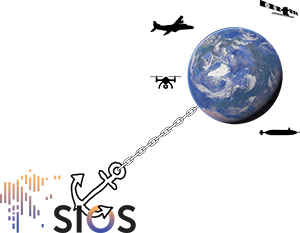This webinar series was initiated by the SIOS remote sensing service in spring 2020 as a response to the challenges posed by the COVID-19 pandemic in order to give the SIOS community an anchor point in a drifting world!
Each webinar is dedicated to a specific theme within Earth system science. Usually, 3-6 speakers are invited, leaving room for discussion and creating a social experience within the research community.
If you would like to contribute as a speaker, recommend a speaker or have further questions, please contact the remote sensing officer.
Upcoming webinars
Summer break
Previous webinars
Most talks are available as a video.
- Webinar #15: 26/05/2023 - Ground motion service for Svalbard (InSAR Svalbard)
-
In a new project funded by the Norwegian Space Agency, NGU and NORCE are developing a Ground Motion Service for Svalbard based on Synthetic Aperture Radar Interferometry (InSAR) technology. In this webinar, Marie Bredal and Line Rouyet presented the objectives of the project, described the workplan and showed examples of products.
Welcome, updates from SIOS-KC and introduction to the webinar
Shridhar Jawak (SIOS Remote Sensing Officer)InSAR Svalbard Ground motion service for Svalbard - (video 00:00:00 - 00:09:36)
Marie Bredal (NGU)InSAR Svalbard Ground motion service for Svalbard - (video 00:09:36 - 00:32:17)
Line Rouyet (NORCE)InSAR Svalbard: workplan - (video 00:32:17 - 00:38:17)
Marie Bredal (NGU) - Webinar #14: 12/05/2023 - Citizen science in Svalbard
-
Welcome and updates from SIOS-KC
Shridhar Jawak (SIOS Remote Sensing Officer)Introduction to the webinar
Zuzanna Swirad (IG-PAS; SIOS RSWG ECR Observer)Can Citizen Science go beyond awareness raising and contribute to environmental monitoring?
Nuria Castell (NILU)Walruses from Space - (video 00:00:00 - 00:15:12)
Peter Fretwell (BAS)How to get citizen science right? - (video 00:15:12 - 00:28:55)
René van der Wal (SLU) - Webinar #13: 25/11/2022 - Machine Learning in Polar regions
-
This webinar focused on different applications of Artificial Intelligence on Arctic-related data. The webinar speakers should guide the diverse Arctic science community in demonstrating the usefulness of the AI methods in Earth system science.
Welcome and updates from SIOS-KC
Shridhar Jawak (SIOS Remote Sensing Officer)Introduction to the webinar
Sara Aparicio (Solenix for ESA; SIOS RSWG ECR Observer)Human brain vs Deep Learning in extreme environment - (video 00:00:00 - 00:12:46)
Ekaterina Kim (NTNU)Deep Learning for fully-automated Glacier mapping in Arctic regions - (video 00:12:46 - 00:26:09)
Konstantin Maslov (University of Twente)Machine Learning for Arctic Permafrost mapping - (video 00:29:09 - 00:38:41)
WenWen Li (Arizona State University) - Webinar #12: 16/09/2022 - High-resolution satellite data for Arctic Scientists
-
This webinar focused on (1) How to access or request high-resolution satellite data useful for Arctic scientists?, (2) Which parameters one should think about while requesting data?, (3) What kind of data is available?, (4) What are these data useful for?
In brief, the webinar speakers demonstrate the usefulness of the high resolution data for the Arctic research community, and the ways they can access the data.
Welcome, updates from SIOS-KC and introduction to the webinar
Shridhar Jawak (SIOS Remote Sensing Officer)Introduction to SAR Satellite Data: Data types, considerations and more - (video 00:00:00 - 00:12:49)
Hugo Isaksen (KSAT)Introduction to Optical Satellite Data: Data types, considerations and more - (video 00:12:49 - 00:36:12)
Charlotte Bishop (KSAT)Planet's optical daily, global imagery for the Arctic research community - (video 00:36:12 - 00:51:36)
Rhodri Phillips (Planet) - Webinar #11: 10/06/2022 - Remote sensing of the Cryosphere
-
This webinar focuses on outcomes of selected EU-Polar cluster projects listed under the theme Earth observation (https://www.polarcluster.eu/members/categories). A special emphasis is on the role of Earth observation and remote sensing in cryosphere and how these projects contribute to advance our knowledge in polar regions.
Welcome and introduction to the webinar
Shridhar Jawak (SIOS Remote Sensing Officer)Introduction to EU Polar Cluster - (video 00:00:00 - 00:14:37)
Anneli Strobel (EU-PolarNet 2 Project Manager)Outcomes from the KEPLER project - (video 00:14:37 - 00:31:28)
Carolina Gabarro (Institute of Marine Science, CSIC)Outcomes from the INTAROS project - (video 00:31:28 - 00:47:44)
Stein Sandven (NERSC)Expected outcomes from Arctic PASSION project - (video 00:47:44 - 01:05:07)
Jonathan Bamber (University of Bristol)SIOS Remote Sensing activities and opportunities - (video 01:05:07 - 01:19:44)
William Harcourt (University of St. Andrews; SIOS RSWG ECR Observer) - Webinar #10: 08/02/2022 - Updates from SIOS-InfraNor
-
This webinar focused on the SIOS InfraNor project.
Results from three years monitoring of vegetation phenology and Sun-Induced Fluorescence (SIF) in Adventdalen, Svalbard - Video
Hans Tømmervik (NINA)COAT and the ecological condition of Arctic tundra - Video
Åshild Ø. Pedersen (NPI)Climatic gradients in Svalbard: weather stations in the COAT network - Video
Ketil Isaksen (Met Norway)Extending the Svalbard permafrost monitoring network - Video
Hanne H. Christiansen (UNIS)Upgraded weather stations at remote locations - Video
Ketil Isaksen (Met Norway)Snow measurements in Svalbard - Video
Eirik Malnes (NORCE) - Webinar #09: 03/12/2021 - Environmental Impact of Research in Svalbard
-
Welcome, updates from SIOS-KC and introduction to the webinar
Shridhar Jawak (SIOS Remote Sensing Officer)Estimating the environmental impact of AWI-Science and best practice for mitigation
Wiebke Hayen and Verena Mohaupt (AWI)Reducing environmental footprints using autonomous vehicles as research tools and sensor platforms from space to the sea floor - (video 00:00:00 - 00:00:00)
Rune Storvold (NORCE)Proposal for amendments to the Svalbard environmental regulations
Kjell Tore Hansen (Norwegian Environmental Agency) - Webinar #08: 29/10/2021 - Radar systems and their applications in Svalbard
-
Welcome and updates from SIOS-KC
Shridhar Jawak (SIOS Remote Sensing Officer)Introduction to the webinar
William D. Harcourt (University of St Andrews; SIOS RSWG ECR Observer)Snow surveys using a drone-borne ultra-wideband radar
Rolf-Ole Rydeng Jenssen (NORCE)The Svalbard SuperDARN radar: Local and global observations of the Sun-Earth connection
Emma Bland (UNIS)Airborne radar remote sensing in Svalbard using a dual-frequency, fully polarimetric (L/X-band) synthetic aperture radar on LN-LYR - (video 00:00:00 - 00:00:00)
Tom Rune Lauknes (NORCE, UiT) - Webinar #07: 07/05/2021 - Terrestrial Research in Svalbard
-
Welcome, updates from SIOS-KC and introduction to the webinar - PDF
Shridhar Jawak (SIOS Remote Sensing Officer)Spatial ecology of the Svalbard reindeer - PDF (video 00:00:00 - 00:15:11)
Maren Hansen (UNIS/University of Bergen/SIOS)The invertebrates of Svalbard: a grossly misunderstood fauna - PDF (video 00:15:11 - 00:31:58)
Stephen Coulson (UNIS)Feed, breed & die - the amazing life cycle of Svalbard aphids - PDF (video 00:31:58 - 00:44:25)
Karina Wieczorek (University of Silesia)Why do barnacle geese migrate to the Arctic to breed? - PDF (video 00:44:25 - 00:59:00)
Maarten Loonen (University of Groningen)Integrated approaches to understanding Svalbard's terrestrial ecosystems - PDF (video 00:59:00 - 01:17:15)
Peter Convey (BAS) - Webinar #06: 08/03/2021 - International women's day special
-
Welcome, updates from SIOS-KC and introduction to the webinar - PDF
Shridhar Jawak (SIOS Remote Sensing Officer)European Polar Board - 25 years at the forefront of European Polar research - PDF (video 00:00:00 - 00:12:10)
Renuka Badhe (European Polar Board)Climate Science and Arctic Research in the Age of Satellites - (video 00:12:10 - 00:24:36)
Anna Maria Trofaier (ESA Climate Office)Coastal change on Svalbard – ambitions, challenges and needs for data coordination - (video 00:24:36 - 00:36:51)
Maria Jensen (UNIS)Svalbard: A hotspot for international Arctic science collaboration - PDF (video 00:36:51 - 00:51:02)
Jenny Baeseman (Baeseman Consulting LLC)Logistics challenges during MOSAiC - PDF (video 00:51:02 - 01:03:18)
Verena Mohaupt (Alfred Wegener Institute)Panel discussion on how to improve gender balance and diversity within SIOS
- Webinar #05: 12/02/2021 - Projects in the frame of the SIOS Research Infrastructure Access Programme
-
Welcome and updates from SIOS-KC - PDF
Shridhar Jawak (SIOS Remote Sensing Officer)Introduction to the webinar
Inger Jennings (SIOS Access and Logistics officer)Near real-time observations of snow water equivalent for SIOS on Svalbard - PDF (video 00:08:47 - 00:22:40)
Katharina Jentzsch (AWI)NYTEFOX: NY-alesund TurbulencE Fiber-Optic eXperiment - PDF (video 00:22:40 - 00:41:15)
Christoph Thomas (University of Bayreuth)ArcticBioAir: The role of microorganisms in Arctic cloud formation (through biogenic ice nucleation) and its influence on albedo and climate - PDF (video 00:41:15 - 00:53:00)
Luke Cockerton (University of Northumbria)Innovate GLOF: Interdisciplinary observations of the Setevatnet glacier lake outburst flood - PDF (video 00:53:00 - 01:08:41)
Andreas Alexander (UiO)New Particle formation in Arctic- The knowns and the unknowns - PDF (video 01:08:41 - 01:36:35)
Roseline C Thakur (INAR, University of Helsinki) - Webinar #04: 27/11/2020 - Marine science in Svalbard - global to local perspective
-
Welcome, updates from SIOS-KC and introduction to the webinar - PDF
Shridhar Jawak (SIOS Remote Sensing Officer)Ocean predictability, observations and links to UN Decade of the Ocean - PDF (video 00:10:08 - 00:27:30)
Mark Payne (DTU)Observational networks in Europe - PDF (video 00:27:30 - 00:44:55)
Alejandro Orfila (IMEDEA)Sea ice remote sensing - (video 00:44:55 - 01:02:07)
Anton Korosov (NERSC)Information talk about the icebreaker Laura Bassi (characteristics of the ship and tentative logistical plans for 2021) - (video 01:02:07 - 01:18:16)
Franco Coren (OGS)Panel Discussion on the outcomes of the SIOS marine infrastructure network workshop and the next steps for the network - PDF
Manuel Bensi, Arild Sundfjord, Frank Nilsen and Agnieszka Beszczyńska-Möller
Moderator: Inger Jennings (SIOS Logistics and Access Officer) - Webinar #03: 23/10/2020 - Grand Challenge Initiative (GCI) cusp rocket missions in Svalbard and their relevance to atmospheric studies
-
Welcome, updates from SIOS-KC and introduction to the webinar - PDF
Shridhar Jawak (SIOS Remote Sensing Officer)GCI-Cusp history and its relevance to Svalbard studies - PDF (Video 00:00:00 - 00:17:36)
Jøran Moen (UNIS)GCI-Cusp: an observing system for the dynamics of the upper polar atmosphere above Svalbard - PDF
Andres Spicher (University of Oslo)The VISIONS-2 rocket mission: exploring atmospheric escape in the Earth's cusp - PDF (Video 00:17:36 - 00:42:52)
Douglas Rowland (NASA)Grand Challenge Initiative - M/LT project - PDF (Video 00:42:52 - 00:55:58)
Kolbjørn Blix (Andøya Space Centre) - Webinar #02: 24/04/2020 - Remote Sensing II
-
Welcome, updates from SIOS-KC and introduction to the webinar - PDF
Shridhar Jawak (SIOS Remote Sensing Officer)Remote sensing of Svalbard mass balance, 2011-2017 - PDF
Ashley Morris (NPI)A 20-Year MODIS-Based Snow Cover Dataset for Svalbard and Its Link to Phenological Timing and Sea Ice Variability - PDF
Hannah Ming Siu Vickers (NORCE)Carbon cycle in a perspective of glacier recession - marine or terrestrial control? - PDF
Lukasz Stachnik (University of Wroclaw)Panel Discussion on SIOS data management - PDF
Øystein Godøy, Stein Tronstad, Angelo Viola, Bartłomiej Luks
Moderator: Dariusz Ignatiuk (SIOS Science Integration & Data Officer) - Webinar #01: 27/03/2020 - Remote Sensing I
-
Welcome, updates from SIOS-KC and introduction to the webinar - PDF
Shridhar Jawak (SIOS Remote Sensing Officer)Airborne remote sensing in Svalbard (with emphasis on recently launched SIOS’s opportunity) - PDF
Agnar Sivertsen (NORCE)New Pandora Spectrometer instrument and opportunities for atmospheric Cal/Val in Arctic areas - PDF
Ann Mari Fjæraa (NILU)Glaciological & microbiological observations of Lomonosovfonna perennial firn aquifer
Veijo Pohjola (Uppsala University)The support of terrestrial photography on cryospheric studies in Svalbard islands - PDF
Roberto Salzano (CNR)Svalbard glacier mass balance from annual Arctic DEMs 2013-2017 - PDF
Jack Kohler (NPI)Panel discussion on damage mitigation for the Svalbard scientific community
Heikki Lihavainen, Jack Kohler, Agnar Sivertsen, Roberto Salzano, Ann Mari Fjæraa
Moderator: Veijo Pohjola (Co-Chair SIOS RSWG)
Additional recordings
- Lectures from the SIOS Training Course on Artificial Intelligence in Svalbard (05/09/2022 - 09/09/2022)
- Lectures from the SIOS Training Course on Hyperspectral Remote Sensing in Svalbard (06/09/2021 - 10/09/2021)
-
SIOS Training Course on Hyperspectral Remote Sensing in Svalbard
- Lectures from the SIOS Training Course on Terrestrial Remote Sensing in Svalbard (31/08/2020 - 04/09/2020)
-
SIOS Training Course on Terrestrial Remote Sensing in Svalbard
- Presentations from the SIOS Remote Sensing online conference 2021 (08/06/2021 - 10/06/2021)
- Presentations from the SIOS Remote Sensing online conference 2020 (04/06/2020 - 05/06/2020)




























